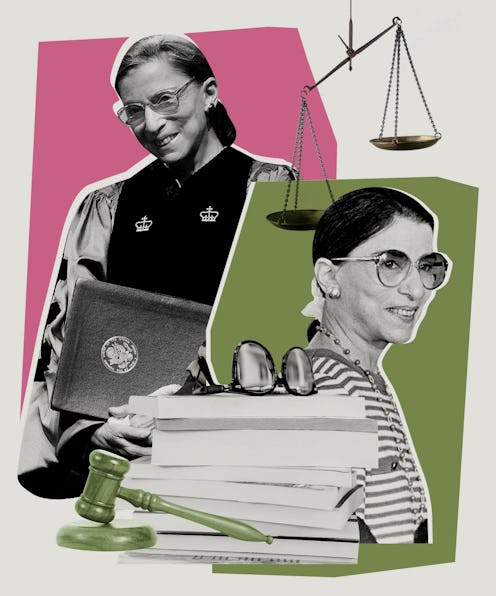Wellness
A Law Student Reflects On RBG's Legal Legacy
“Justice Ginsburg was a master of means.”

Following the death of Supreme Court Justice, Ruth Bader Ginsburg, on Sept. 18, the world celebrates her life and reflects on her legacy's future impact. Adrienne,* 26, a second-year law student, shares what Justice Ginsburg means to her. As told to Griffin Wynne.
I knew from the beginning that I wanted to go to law school. From a young age, I always tried to approach things in a lawyerly way. I wanted the tools that law school provides you with — how to structure an argument, be compelling, and make your case.
When I was younger, I was very interested in politics. Over time, it transitioned into geopolitics and national security. I'm now studying private international law. I didn't have that moment — you know, the one where I first learned about Ruth Bader Ginsburg as a young girl and thought to myself, I want to be her. But being interested in the law, I, of course, learned about Ruth Bader Ginsburg. She's a hero to many, myself included. She's someone who exemplifies how intelligence, hard work, and perseverance can lead you to the ultimate successes in life. The most remarkable thing about her is that she achieved so much success while never giving up her principles. Her legacy is a lesson to everyone, not just women or lawyers — a reminder of the importance of having real moral convictions.
You must stay true to your values while not undermining others around you.
Her passing has immediately put in perspective for me that there’s no better way of living your principles than being strategic with how you approach them. It's easy to get heated and emotional when talking about social issues that are so emotional. But if you're engaging with someone who disagrees with you, a passionate rant is not going to convince them to change their mind. You must stay true to your values while not undermining others around you. When debating someone in class or trying to pass a law, you always have to have perspective. Find common ground and start with a mutual understanding. Once you do that, the impact will be so much more rewarding.
I think a lot of progressive arguments can be grounded in very intellectually elitist perspectives. The language surrounding many social justice movements, like gender identity or racial justice, isn't always accessible. The ends, or goals of the movement, may be well intentioned, but the means are flawed. There can be a lot of shaming and divisiveness. To me, Justice Ginsburg was a master of the means. Think about her work with women’s rights — she took a very carefully constructed, reasoned, and through approach when tackling this sensitive legal issue. Her ends were so commendable, but I think the reason why she is going down in history is that she meticulously and carefully worked the means, on the argument she would use to get to the end. That is the beauty behind her legacy.
She didn't fight to be a celebrity — she fought for basic fundamental rights.
In some ways, I love the caricature that's been created for her, the “Notorious RBG.” I think celebrating individual politicians, focusing so much on "The One" can inevitably take away from the movement. Now that she's gone, I don't want her to become a pin or a quote that gets printed on a tote bag. To me, that's not her legacy, and this praise is distracting from what's really at stake. She didn't fight to be a celebrity — she fought for basic fundamental rights.
I'm still in law school, so it's too soon to know exactly how I will heed RBG's example. Right now, I'm most inspired by her commitment to her cause and her skill in realizing the things she cared about. She's always in the back of my mind.
This article was originally published on